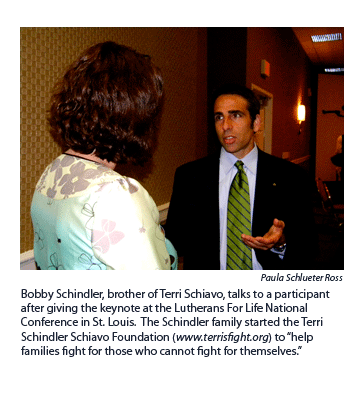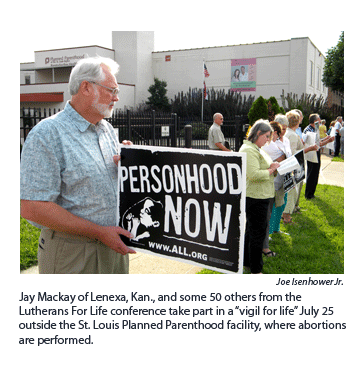By Paula Schlueter Ross
In his keynote to the 26th National Conference of Lutherans For Life (LFL), July 24-25 in St. Louis, Bobby Schindler said his sister, Terri Schindler Schiavo, did not die a peaceful death, as her husband has said.
In Terri’s last days, while husband Michael Schiavo’s attorney was telling reporters he’d never seen Terri so “beautiful,” the Schindler siblings were begging  their mother not to visit her daughter, whose court-ordered starvation had ravaged her body almost beyond recognition.
their mother not to visit her daughter, whose court-ordered starvation had ravaged her body almost beyond recognition.
Bobby Schindler said it was impossible for him to describe his sister after two weeks without food, water and palliative care, but called her slow death “the most heinous, barbaric thing I ever had to witness.”
Some 275 people attended the annual conference, which included a pre-conference leaders workshop, plenary sessions, worship, a banquet, an abortion-clinic vigil, and workshops on a variety of pro-life topics under the theme “Celebrating the Abundant Life,” from John 10:10.
In his keynote, Schindler said that in his home state of Florida, it’s a felony to starve an animal, “but we’re doing it to our most disabled people.”
Schindler said his sister’s situation can’t be classified as an “end-of-life issue,” since Terri was not dying, was not in a coma, was not “brain dead,” and was not in a “persistent vegetative state.”
In fact, his family thought she was getting better — she was starting to form words and trying to talk, abilities that would surely have improved with rehabilitation, he said.
The Schindlers were “shocked,” he said, when they learned that Terri’s husband wanted to remove her feeding tube — which she needed because she had trouble swallowing — and they offered to care for her themselves. But after five years of trying to save Terri, even with support from around the world, the court ruled in Michael Schiavo’s favor.
Schindler said he believes more and more U.S. judges, lawmakers, the media — even some in the medical profession — are embracing a “quality of life mentality” in deciding whether disabled people should live or die.
“Who would want to live in this condition?” is the wrong question to ask, he says, since thousands of people are living “in this condition” nationwide.
Schindler sees two choices: You rationalize that it’s OK to kill people with disabilities, or you take care of them. In a chilling development, food and water, he said, can now be classified by courts as “life support,” even for those who, like Terri, are not dying.
“What I saw happen to my sister, no brother, no family, no parents, in particular, should ever have to witness,” said Schindler, who, with his parents, Robert and Mary, and sister, Suzanne, have started the Terri Schindler Schiavo Foundation to “help families fight for those who cannot fight for themselves.” The St. Petersburg, Fla.-based foundation has received more than 600 calls since it was established in 2001 and has assisted in 100-plus cases. (For more information, visit its Web site at www.terrisfight.org.)
Schindler encouraged LFL conference-goers to:
- care about the value-of-life issue. Apathy, he said, has made the problem worse. “We have to look at this issue [as being] just as impor
 tant as … the abortion issue because it is the same issue — it’s the killing of life.”
tant as … the abortion issue because it is the same issue — it’s the killing of life.” - support pro-life lawmakers who “have the same principles and values that we do because they’re in positions where they can change the laws and help stop things like this from happening.”
- write the media. “Be professional and kind … and tell them that we disagree with their position. It works.”
- continue to pray.
- educate people. “I think we can change their hearts when they see just how barbaric this issue is.”
Schindler called the audience “heroes,” and commended them for their willingness to fight for life.
LFL Executive Director James Lamb said Schindler’s talk was “very powerful” because “he was speaking out of his love for his sister, and out of his great desire that what happened to her would not happen to others.”
Lamb said LFL “has a part in sharing that message, to help people know what’s going on and that we can indeed do something about it because we’ve got a more powerful message than the message of death, and that’s the Lord of Life.”
The next LFL national conference is planned for July 23-24, 2010, in Milwaukee, under the theme “Bringing Good News to Life.”
For more information about Lutherans For Life, call 888-364-LIFE (5433) or visit its Web site at www.lutheransforlife.org.
Re-posted Sept. 8, 2009

 tant as … the abortion issue because it is the same issue — it’s the killing of life.”
tant as … the abortion issue because it is the same issue — it’s the killing of life.”

